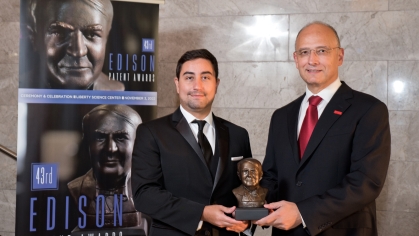LAB REPORT: Exploring Materials Synthesis and Electrical Properties


When Shriram Ramanathan joined the Department of Electrical and Computer Engineering faculty as a professor and as the first holder of the Rodkin-Weintraub Chair in Engineering in the fall of 2022, he was an acknowledged leader in metastable semiconductors and device physics for AI, robotics, brain-machine interfaces, and adaptive electromagnetic materials and devices.
His Ramanathan Laboratory furthers his work in these areas through productive collaborations with researchers in condensed matter physics, computational sciences, physical chemistry, neuroscience, and engineering both within Rutgers and at other universities, such as Brandeis University, as well as with national laboratories such as Brookhaven National Laboratory, Argonne National Laboratory, and Sandia National Laboratories.
Ramanathan notes that fundamental research divisions of US science agencies are currently providing some funding to his lab, while student participation helps fuel its research projects. “Students and post-doctoral scholars are engaged in projects through hands-on experiments, data analysis, and presentations of their work to technical audiences,” he reports.
An Ongoing Focus on Basic Research
According to Ramanathan, his pursuit of basic research in the past couple of decades derives from the challenge of enhancing the performance of computing machines “as we are approaching the ultimate physical limits of scaling. Disruptive approaches,” he explains, “are welcome in this regard to overcome bottlenecks in information processing.

“Basic research, therefore, is important to help advance new concepts in this field. Projects in our lab focus on materials synthesis and electrical properties,” he explains. “Potential applications include low power electronics and brain-machine interfaces for information transfer.”
Of particular interest, Ramanathan says, is his lab’s research “related to the synthesis of thin film semiconductors and understanding their physical properties.”
His focus on metastable semiconductors has positive ramifications for AI, which he says, “can benefit from knowledge gleaned from nature that has had millions of years to optimize structure and function.”
Yet he warns that “Urgent efforts to make AI sustainable are needed to address potential concerns including the excessive power consumption in current AI technologies.”
Looking toward the future, Ramanathan says he is optimistic that his current research will enable “low power electronics and contribute to making energy-efficient devices.”


